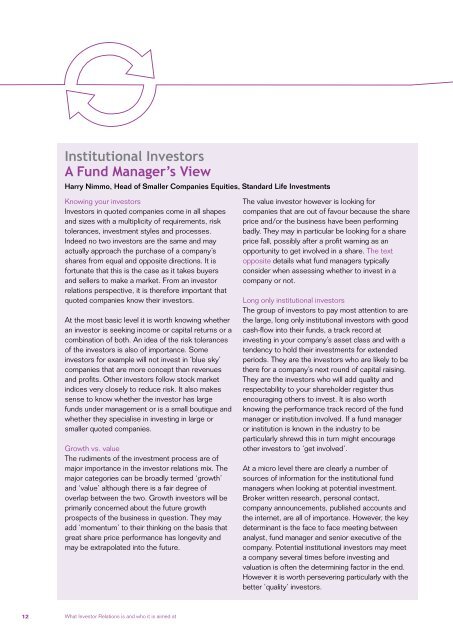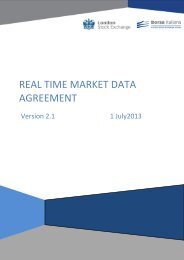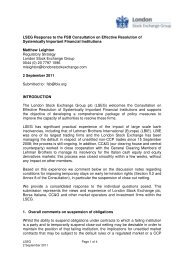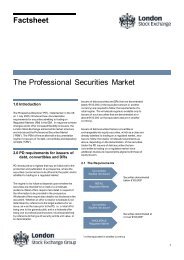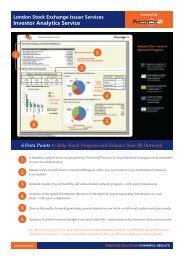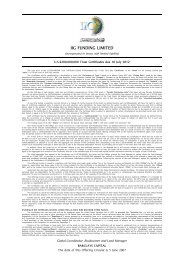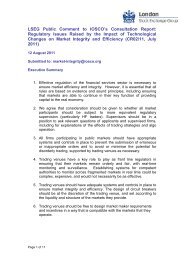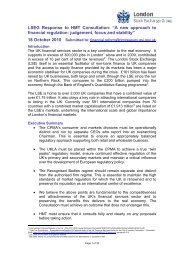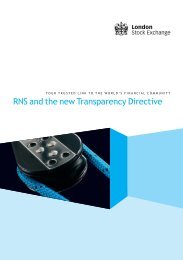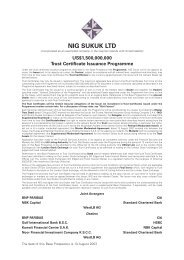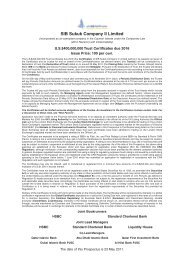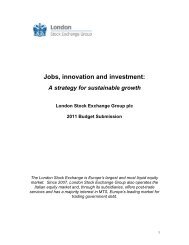Investor Relations - A Practical Guide - Investis
Investor Relations - A Practical Guide - Investis
Investor Relations - A Practical Guide - Investis
Create successful ePaper yourself
Turn your PDF publications into a flip-book with our unique Google optimized e-Paper software.
Institutional <strong>Investor</strong>s<br />
A Fund Manager’s View<br />
Harry Nimmo, Head of Smaller Companies Equities, Standard Life Investments<br />
Knowing your investors<br />
<strong>Investor</strong>s in quoted companies come in all shapes<br />
and sizes with a multiplicity of requirements, risk<br />
tolerances, investment styles and processes.<br />
Indeed no two investors are the same and may<br />
actually approach the purchase of a company’s<br />
shares from equal and opposite directions. It is<br />
fortunate that this is the case as it takes buyers<br />
and sellers to make a market. From an investor<br />
relations perspective, it is therefore important that<br />
quoted companies know their investors.<br />
At the most basic level it is worth knowing whether<br />
an investor is seeking income or capital returns or a<br />
combination of both. An idea of the risk tolerances<br />
of the investors is also of importance. Some<br />
investors for example will not invest in ‘blue sky’<br />
companies that are more concept than revenues<br />
and profits. Other investors follow stock market<br />
indices very closely to reduce risk. It also makes<br />
sense to know whether the investor has large<br />
funds under management or is a small boutique and<br />
whether they specialise in investing in large or<br />
smaller quoted companies.<br />
Growth vs. value<br />
The rudiments of the investment process are of<br />
major importance in the investor relations mix. The<br />
major categories can be broadly termed ‘growth’<br />
and ‘value’ although there is a fair degree of<br />
overlap between the two. Growth investors will be<br />
primarily concerned about the future growth<br />
prospects of the business in question. They may<br />
add ‘momentum’ to their thinking on the basis that<br />
great share price performance has longevity and<br />
may be extrapolated into the future.<br />
The value investor however is looking for<br />
companies that are out of favour because the share<br />
price and/or the business have been performing<br />
badly. They may in particular be looking for a share<br />
price fall, possibly after a profit warning as an<br />
opportunity to get involved in a share. The text<br />
opposite details what fund managers typically<br />
consider when assessing whether to invest in a<br />
company or not.<br />
Long only institutional investors<br />
The group of investors to pay most attention to are<br />
the large, long only institutional investors with good<br />
cash-flow into their funds, a track record at<br />
investing in your company’s asset class and with a<br />
tendency to hold their investments for extended<br />
periods. They are the investors who are likely to be<br />
there for a company’s next round of capital raising.<br />
They are the investors who will add quality and<br />
respectability to your shareholder register thus<br />
encouraging others to invest. It is also worth<br />
knowing the performance track record of the fund<br />
manager or institution involved. If a fund manager<br />
or institution is known in the industry to be<br />
particularly shrewd this in turn might encourage<br />
other investors to ‘get involved’.<br />
At a micro level there are clearly a number of<br />
sources of information for the institutional fund<br />
managers when looking at potential investment.<br />
Broker written research, personal contact,<br />
company announcements, published accounts and<br />
the internet, are all of importance. However, the key<br />
determinant is the face to face meeting between<br />
analyst, fund manager and senior executive of the<br />
company. Potential institutional investors may meet<br />
a company several times before investing and<br />
valuation is often the determining factor in the end.<br />
However it is worth persevering particularly with the<br />
better ‘quality’ investors.<br />
12<br />
What <strong>Investor</strong> <strong>Relations</strong> is and who it is aimed at


